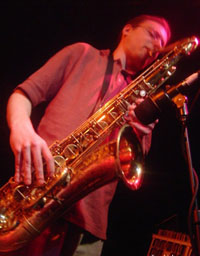
Jeff Sackmann is a composer, saxophonist, and bandleader with an embarrasing affection for bubblegum pop.
In an effort to create serious music for his 15-piece jazz orchestra, Oy Christina!, he has combined baroque fugue with Justin Timberlake, introduced serialism to Eminem, and spiced up dance mixes with Coltrane changes. For his trio Single White Female, among others, he has written several dozen pieces for small jazz ensemble that occasionally bridge the gap between chamber music and traditional combo playing.
As a saxophonist, Jeff spent several months performing with Clyde Stubblefield, the original funky drummer. He plays with a variety of rock bands in New York City and spent three years as the music director for the swing band Little Red and the Howlers.
Hailing originally from Spokane,Washington, he spent his undergraduate years at New York University, did graduate work in English Literature at the University of Wisconsin-Madison,and studied music at Berklee.
|



